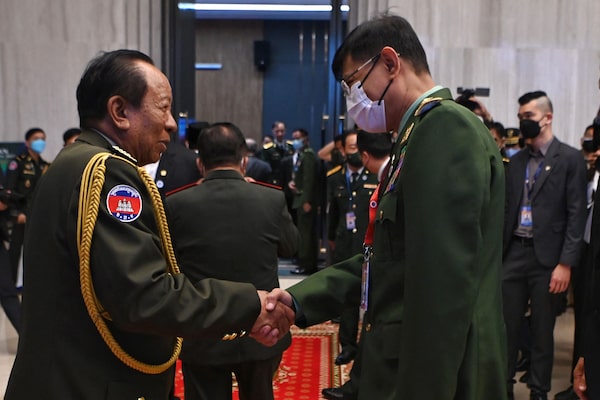
Cambodia's Deputy Prime Minister and Defence Minister Tea Banh, left, shakes hands with Myanmar's military Defence Minister Mya Tun Oo during the ASEAN Defence Ministers Meeting in Phnom Penh on June 22.TANG CHHIN SOTHY/AFP/Getty Images
Myanmar’s government-in-exile says the Association of Southeast Asian Nations’ efforts to promote peace in the country since last year’s military coup have been a failure and is asking for neighbouring countries to do more for refugees.
“Where are the results? There are no results on the ground in Myanmar,” said Dr. Sasa, minister for international co-operation in the National Unity Government of Myanmar (NUG). “They have to do more.”
Dr. Sasa, who goes by one name, was speaking during an online news conference Wednesday, just over 500 days since Myanmar’s civilian government was overthrown by the military in February last year, plunging the country into chaos.
Earlier the same day, a senior member of the military government joined a meeting of ASEAN defence ministers in the Cambodian capital of Phnom Penh, despite pressure from some countries in the regional bloc and pro-democracy groups to exclude the junta from such gatherings.
General Mya Tun Oo – who has been sanctioned by Canada, the United States and the European Union in response to his role in the coup – is the most senior Myanmar official to attend an ASEAN meeting since the junta was sidelined late last year over its failure to honour a peace plan agreed with the group.
Divisions persist within the 10-nation bloc over how to deal with the military regime. Singapore, the Philippines, Indonesia and Malaysia have urged current chair Cambodia to exclude the junta until progress is made toward ending hostilities.
The Malaysian Defence Ministry said that even though Wednesday’s meeting involved the military government, it doesn’t mean that the country recognizes the junta “as the legitimate government of Myanmar.”
NUG minister Kyaw Zaw praised Malaysia and other countries for pushing ASEAN to engage more with the NUG, and also welcomed the government of Canada’s recent decision to appoint a special envoy for Myanmar.
“We hope that we will have more engagement with Canada, government-to-government, as well as with parliament and civil society,” he said.
At least 1,500 civilians have been killed by the military since the coup, with fighting having displaced more than 300,000 people, according to the United Nations. Thousands of anti-junta activists and pro-democracy protesters have been imprisoned, including senior members of the former civilian government.
According to a tally by the International Institute for Strategic Studies think tank, there have been almost 7,500 attacks and armed clashes since the coup, with the military fighting resistance forces and ethnic armies nationwide. Already in June, there have been more than 500 attacks, and dozens of bombings, most in central Myanmar, near the country’s second-largest city, Mandalay.
The NUG claims its allied forces control about 50 per cent of Myanmar, though this could not be independently verified. Dr. Sasa said the exile government was providing vital services to the population in areas it controls, including education and medical supplies.
While the NUG and other anti-junta groups have received support and assistance from the international community, the crisis in Myanmar has slipped from headlines since the war in Ukraine broke out.
NUG minister Htin Linn Aung said that “even if we could get a fraction of the aid given to Ukraine, we will win and there will be a democratic country in Southeast Asia.”
“The people of Ukraine and the people of Myanmar are the same, we are fighting for freedom, we are fighting for democracy,” Dr. Sasa said.
He contrasted unfavourably “what ASEAN is doing in the Myanmar crisis” to the level of assistance provided by the European Union to Ukraine, and the welcoming of Ukrainian refugees by neighbouring countries.
“Our neighbours should open their borders to help the people of Myanmar,” Dr. Sasa said. “ASEAN has to learn this lesson from the EU.”
Responding to a question from The Globe, he said “yes, you are right absolutely that the Myanmar crisis has been forgotten on the international stage.”
“What we’re asking is please don’t forget us.”
With a report from Reuters.
Our Morning Update and Evening Update newsletters are written by Globe editors, giving you a concise summary of the day’s most important headlines. Sign up today.
 James Griffiths
James Griffiths